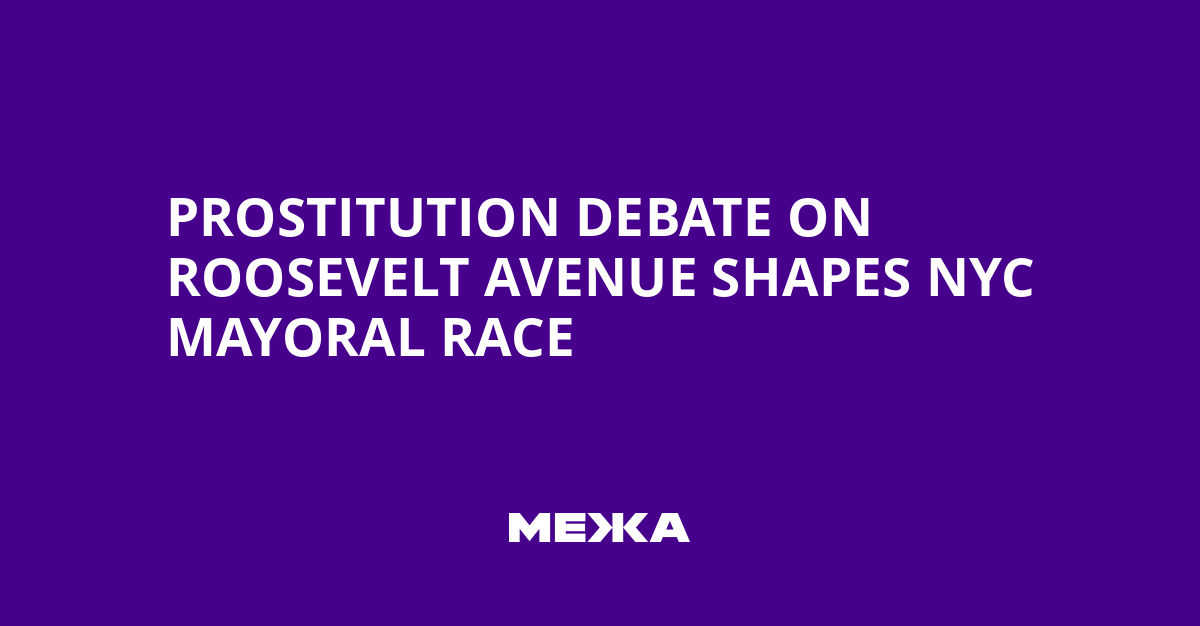New York – Roosevelt Avenue in Queens runs through one of the city’s most densely populated neighborhoods, becoming a vibrant kaleidoscope of culture as the 7 train moves along.
Nearby are Colombian restaurants and taco stalls, with Indian cuisine and fruit stands nearby. Vendors offer homemade tamales and grilled meat dishes. If you go further in, you can find mobile-phone repair shops that also handle money transfers, as well as salons where brows are trimmed. Looking further, you encounter sari sellers or imported underwear promising to slim the figure.
Prostitutes are typically seen at night and sometimes during the day strolling along the avenue and throughout the Jackson Heights neighborhood.
The issue has troubled New York City’s two most recent administrations and has now become a topic in the mayoral campaign.
Opposition from Zohran Mamdani points to his support for decriminalizing prostitution as evidence of a “soft-on-crime” stance by the Democratic candidate, though Mamdani’s team disputes that he supports legalization. Focusing on this topic, Andrew Cuomo’s aides claim he could draw votes from South Asian and Muslim voters by employing a symbolic argument no less political.
Cuomo has intensified his attacks on Mamdani’s position, notably emphasizing the issue to religious communities and asserting that Mamdani’s ideas are “haram” – an Arabic term meaning “forbidden.” His aides believe this could attract more conservative voters who reject Mamdani’s cultural pride, the Ugandan-born son of Indian parents.
Farhad Soleiman, secretary-general of the Jackson Heights Bangladeshi Association, believes Cuomo’s message is reaching the audience.
“I spoke to Cuomo, and our community needs to understand these are the issues, and I am saying they are outraged because this is against Islam and, frankly, against any society,” Soleiman said.
– Farhad Soleiman
He adds that Mamdani had been supported as a Muslim brother and South Asian representative, but after a prostitute approached him and his 11-year-old son in their car at a red light on Roosevelt Avenue, his view on the issue changed.
“This really blew my mind that day,” Soleiman said. “We supported him as a Muslim brother, as a South Asian brother, but then I read his program and said: wow.”
Mamdani’s stance on this topic remained uncertain for several weeks, giving Cuomo the opportunity to sharpen his criticisms about his consistency.
At recent debates, Mamdani clarified that he does not support the legalization of prostitution. He said he would support decriminalization of the practice provided two adults consent.
“I don’t think we should prosecute women who are struggling, who are currently being jailed,” Mamdani said.
New York City Council member Shekar Krishnan, the first Indian-American elected to the City Council who represents Jackson Heights, backs Mamdani. Krishnan commented on the issues on Roosevelt Avenue and criticized Cuomo’s campaign approach.
“Using this as a wedge to push the South Asian community apart is wrong, because there is something deeper that resonates with us,” Krishnan said. “Regardless of which South Asian community you come from, they are all in the same fight; every day I hear from my constituents how hard it is to get by and how the city has become unaffordable.”
According to Mateo Guerrero, the average number of encounters with prostitutes per night on Roosevelt Avenue in the last month is about 15. Guerrero is a transgender man and a leading organizer of Make the Road NY, an immigrant-rights organization that runs night walks in neighborhoods where clubs and establishments operate around the clock.
During walks, Guerrero tries to connect sex workers with resources, including legal aid provided by his organization. He says the best way to help people who become victims is to persuade sex workers that they can seek help safely and avoid arrests or immigration troubles.
Make the Road NY and other groups support a state bill known as the Cecilia Act – named after Cecilia Gentile, a transgender sex worker activist who passed away last year. The law would decriminalize the purchase and sale of sex while preserving laws against human trafficking and other crimes involving minors.
“People are just trying to survive: scraping together money for food, living as transgender women or women, and fearing the police,” Guerrero said.
Last year, Mayor Eric Adams’s administration launched the “Roosevelt Recovery Operation” in response to community concerns. Adams noted that the eight-month operation led to a reduction in crime, with over 2,500 arrests, 397 of which involved prostitution.
Guerrero, who did not support the operation, believes that the intensified police presence created fear among the broader community, including undocumented immigrants who fear interacting with the police even after they have become victims of crime.
“The impact was not on the prostitutes but on all workers: those who fear going out at night, going to supermarkets, returning from work on the train,” Guerrero added.
Activists also note that Cuomo in 2021 supported a ban on Walking While Trans, which repealed a 1976 law criminalizing loitering for prostitution. In a statement after signing, the law was deemed archaic and noted that people of color and transgender people faced discriminatory police scrutiny for their appearance.
During this year’s mayoral campaign, Cuomo again backed Mamdani on decriminalizing the sale of sex between two adults within the first general election debate, stating that “the worst thing that could happen” would be the decriminalization of this practice.
“It would be terrible for quality of life”
– Andrew Cuomo
Mamdani responded to Cuomo’s attacks, calling them an attempt to confuse voters, and noted that Cuomo recently visited South Asian communities or among Muslims in New York. According to Mamdani, Cuomo spent his time “lecturing instead of listening.”
Cuomo summed up the campaign with his actions, but Mamdani continues to defend his position on the criminalization of prostitution and the overall quality of life in the city, which remains the subject of sharp debates and influences in New York’s political landscape.

